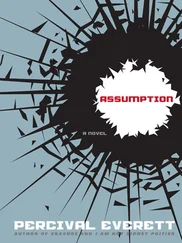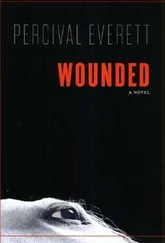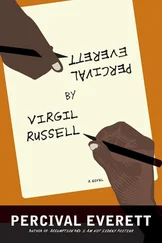Mr. Powell nodded.
“I want to be a dentist.”
Mr. Powell was silent for a second as he looked out over the water. “What about you, Bird?”
“A ballplayer, I guess. Baseball.”
“No, you should go into music. You should pick up the saxophone. You’ve got the lips for it. Lips just like Bird.”
I looked at Daddy and saw him smiling at me. He was sliding his hook through a nightcrawler. “Maybe you should think about that, Craig,” Daddy said. “About taking up the saxophone.” Daddy dropped his line in.
“Why was your wife wearing that coat, Doc?” Mr. Powell slapped a mosquito on his neck.
Daddy sighed and then he looked at Mr. Powell. “Well, Bud, I’ll tell you. She’s crazy.”
Mr. Powell laughed and then he stopped. He just watched as Daddy attended to his line.
“What you got, Daddy?” Martin asked.
Daddy pulled in a catfish. “I told you this was a great spot,” Daddy said.
A few minutes later Mr. Powell snagged something. His line got tight and he started pulling and reeling. “Jesus,” he said. The tip of his pole curved around to point toward the water.
“What you got there?” Daddy asked.
“I don’t know,” Mr. Powell said, “but it don’t seem like no catfish.” He pulled the line in and at the end of it was a sack.
Martin reached over and grabbed the line. He pulled the sack out of the water, over the edge, and into the boat.
“No,” said Mr. Powell, “don’t open it. Don’t open it.” He sat up straight and frowned.
Martin stopped and looked at Mr. Powell. “Don’t open it?”
“Don’t open it,” Mr. Powell repeated.
Martin hesitated, then he grabbed the sack and dumped what was inside onto the bottom of the boat. It was kittens, little kittens, little, wet, dead, decomposed kittens. And a rock.
“Damn,” said Mr. Powell, turning his head.
“I didn’t know what was in there,” Martin said, anticipating a reaction from Daddy.
“Just put them in the sack and toss it back in the water,” Daddy said.
“With my hands?” Martin whined.
“You dumped them out.” Daddy raised his eyebrows.
Martin pushed the kittens back into the sack, and also the rock. Then he dropped the sack over the side. Martin put his hands into the water and rubbed them together.
Not too much was said about the kittens. As the morning passed, Daddy caught a few more fish, Martin caught one, and I pulled in two, but Mr. Powell didn’t catch a single one.
“Well, damn,” said Mr. Powell. “I must be doing something wrong or else you fellas are fishing with cheese.” Just then his line went tight.
“You’ve got one, Mr. Powell,” I said, standing up. I was excited for him. Daddy pulled me down.
“Look at the size of that thing,” Mr. Powell said. Then his line snapped and the pole flew back like a whip. Mr. Powell looked quickly at me and then stepped out of the boat into the water.
Daddy stood up. “Bud!”
The water came up to Mr. Powell’s chest. He was searching around with his hands for the fish. He put his hands, palms down, on the surface of the water and looked around. “Damn,” he said. “Damn.”
The next night I ask Peter if he wants to go to the game with me and he shakes his head and I go alone. I sit in the stands behind our dugout and watch the game. I watch third baseman Manny Ortega initiate a double play and hit a double and clobber a lazy change-up over the right-field fence. I just sorta scratch my head and start feeling uneasy. The Yankees get beat.
After the game, Lou Tyler comes over and spits some tobacco juice and asks if I want to ride home with him.
“I’ve got my car,” I tell him.
“But I ain’t got mine.”
So, after he changes, we go get into my car, but he don’t want to go straight home. “Just where do you want to go?” I ask.
“Find a nice little country road. Get out of town.”
We drive off and he pushes a cigar into his face and starts asking me how things are at home. I tell him that everything at home is just fine.
“How’s Thelma?”
“She’s good.”
“How’s your boy?” He blows some smoke out and then spits out the window.
“He’s okay.”
“David tells me things are sorta tense around your house.”
“Things are fine.” We’re out of the city pretty much by now. There are houses, but less lights. “How far out you want to go?”
“Keep going.”
He sits quietly for a while, gnawing on his cigar. “You know, I really hate that Dome.”
“Yeah? Why is that?”
“I don’t know. It’s big. It’s ugly. It ain’t a ball park. You know what I mean?”
“I know.”
“It just ain’t a ball park. Stop the car!” he shouts and he’s excited and he’s pointing over to the left side of the highway.
I stop the car. “What is it?”
He’s out of the car and across the road and I’m out and after him. “Great,” he says. “Terrific.” He’s looking down at a dog that’s been run over. He bends over and looks at the dog real close. “Good shape.”
“What are you talking about?”
He’s down and picking up this German shepherd dog. “Well, help me,” he says. “This ain’t no little dog.”
“What do you want with this dog?”
“I want to stuff it. Now, help me put it in the car.”
“My car?”
“I don’t see another one. Come on, grab the back legs.”
I bend over and take the back legs in my hands. I look at all the blood and guts running out of the dog’s middle and I feel a little sick. The dog’s head is hanging loose next to Lou’s leg and we walk across the road to the car.
“You want to put him in the back seat or the trunk?” Lou asks.
“I don’t want to put it in at all.”
“We better put it in the trunk — might smell a little.” We put the dog in the trunk and get back into the car. Lou’s eyes are searching the road and the bushes and he’s sitting up close to the windshield.
“What are you looking for?”
“Road kills,” he says matter-of-factly, “like the one in the trunk.”
“You’re not filling my trunk up with dead dogs. I’m sorry.”
“They ain’t gonna hurt nothing. Where else am I supposed to get specimens?”
“Okay, okay.”
“Stop!”
I stop the car and we get out and pick up another dead dog and toss it into the trunk. I got blood on my hands and I don’t like it. I’m getting just a little bit upset. “I hope you’re satisfied. I can smell them up here.”
“There!” he yells and grabs the steering wheel and the car swerves and we just miss this deer running across the road.
“Jesus!” I screamed. “What are you doing!”
“Shit, we missed.”
“You mean to tell me that you really wanted to hit that deer?”
“No, but I need one.”
I let out a sigh and I turn to see Lou yawn and I says, “You ready to go home yet?”
“Yeah, I guess it’s getting pretty late. Too bad about that deer, though.”
“Those are the breaks,” I says.
So, I take Lou home and by the time I get home myself it’s pretty late. I walk into the house and the first thing I hear is Thelma pedaling on her exerciser. I don’t even go into the bedroom. I just walk over to the stereo and put on that Charlie Parker record and listen to that one song over and over. I just can’t seem to get enough of it.
I get to thinking about the saxophone solo on this here recording and noticing how things get built around one melody. Even when the melody ain’t played at all, somehow it’s there and it’s waiting when the saxophone is finished singing. And that’s just what that saxophone does, it sings.
I notice all of a sudden that I don’t hear the exerciser anymore and I look around to see Thelma. She stands there for a second and pulls the sleeve of her pajamas across her forehead, then she turns and walks back into the bedroom. I hear her climb into bed and I get up to switch off the stereo. The music is off and I’m heading for the bedroom when I hear Thelma get out of bed and start pedaling again.
Читать дальше












